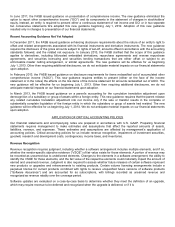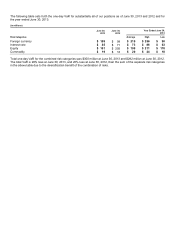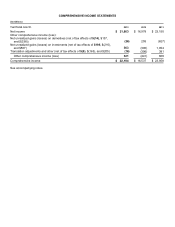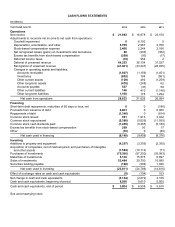Microsoft 2013 Annual Report Download - page 37
Download and view the complete annual report
Please find page 37 of the 2013 Microsoft annual report below. You can navigate through the pages in the report by either clicking on the pages listed below, or by using the keyword search tool below to find specific information within the annual report.determined that implied post-contract customer support (“PCS”) is being provided, revenue from the arrangement is
deferred and recognized over the implied PCS term. If updates are determined to not meet the definition of an upgrade,
revenue is generally recognized as products are shipped or made available.
Windows 8.1 will enable new hardware, further the integration with other Microsoft services and address customer issues
with Windows 8, and will be provided to Windows 8 customers when available at no additional charge. We evaluated
Windows 8.1 and determined that it did not meet the definition of an upgrade and thus have not deferred revenue related
to this planned release.
Windows 7 revenue was subject to deferral as a result of the Windows Upgrade Offer, which started June 2, 2012. The
offer provided significantly discounted rights to purchase Windows 8 Pro to qualifying end-users that purchased Windows
7 PCs during the eligibility period. Microsoft was responsible for delivering Windows 8 Pro to the end customer.
Accordingly, revenue related to the allocated discount for undelivered Windows 8 was deferred until it was delivered or the
redemption period expired.
Microsoft Office system revenue was subject to deferral as a result of the Office Upgrade Offer, which started October 19,
2012. The Office Upgrade Offer allowed customers who purchased qualifying 2010 Microsoft Office system or Office for
Mac 2011 products to receive, at no cost, a one-year subscription to Office 365 Home Premium or the equivalent version
of 2013 Microsoft Office system upon general availability. Small business customers in applicable markets were also
eligible for a three-month trial of Office 365 Small Business Premium. Accordingly, estimated revenue related to the
undelivered 2013 Microsoft Office system and subscription services was deferred until the products and services were
delivered or the redemption period expired.
Impairment of Investment Securities
We review investments quarterly for indicators of other-than-temporary impairment. This determination requires significant
judgment. In making this judgment, we employ a systematic methodology quarterly that considers available quantitative
and qualitative evidence in evaluating potential impairment of our investments. If the cost of an investment exceeds its fair
value, we evaluate, among other factors, general market conditions, credit quality of debt instrument issuers, the duration
and extent to which the fair value is less than cost, and for equity securities, our intent and ability to hold, or plans to sell,
the investment. For fixed-income securities, we also evaluate whether we have plans to sell the security or it is more likely
than not that we will be required to sell the security before recovery. We also consider specific adverse conditions related
to the financial health of and business outlook for the investee, including industry and sector performance, changes in
technology, and operational and financing cash flow factors. Once a decline in fair value is determined to be other-than-
temporary, an impairment charge is recorded to other income (expense) and a new cost basis in the investment is
established. If market, industry, and/or investee conditions deteriorate, we may incur future impairments.
Goodwill
We allocate goodwill to reporting units based on the reporting unit expected to benefit from the business combination. We
evaluate our reporting units on an annual basis and, if necessary, reassign goodwill using a relative fair value allocation
approach. Goodwill is tested for impairment at the reporting unit level (operating segment or one level below an operating
segment) on an annual basis (May 1 for us) and between annual tests if an event occurs or circumstances change that
would more likely than not reduce the fair value of a reporting unit below its carrying value. These events or
circumstances could include a significant change in the business climate, legal factors, operating performance indicators,
competition, or sale or disposition of a significant portion of a reporting unit.
Application of the goodwill impairment test requires judgment, including the identification of reporting units, assignment of
assets and liabilities to reporting units, assignment of goodwill to reporting units, and determination of the fair value of
each reporting unit. The fair value of each reporting unit is estimated using a discounted cash flow methodology. This
analysis requires significant judgments, including estimation of future cash flows, which is dependent on internal
forecasts, estimation of the long-term rate of growth for our business, estimation of the useful life over which cash flows
will occur, and determination of our weighted average cost of capital.
























